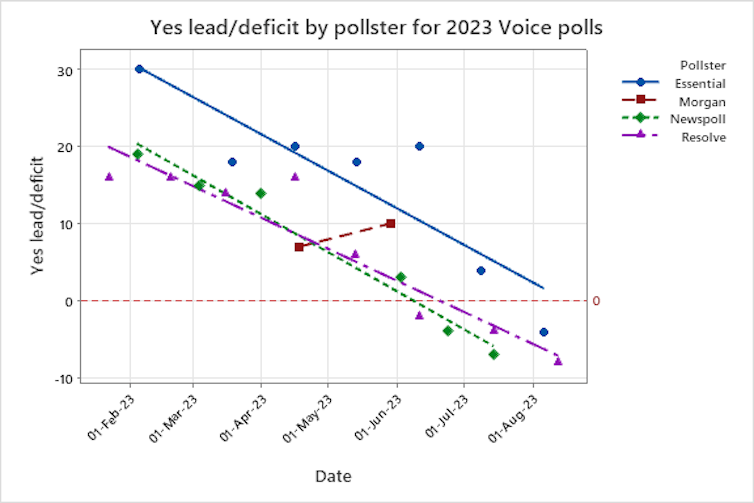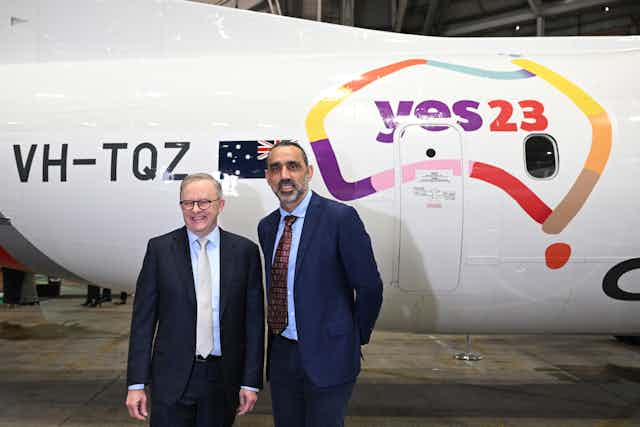A federal Resolve poll for Nine newspapers, conducted August 9–13 from a sample of 1,603, gave Labor 37% of the primary vote (down two since the July Resolve poll), the Coalition 33% (up three), the Greens 11% (steady), One Nation 5% (down one), the UAP 2% (up one), independents 10% (up one) and others 2% (steady).
Resolve does not give two party estimates until close to elections, but applying 2022 election preference flows to these primary votes gives Labor about a 56–44 lead, a 2.5-point gain for the Coalition since July. Resolve has easily been Labor’s most favourable pollster since the 2022 election.
Anthony Albanese’s ratings were 44% good and 42% poor, for a net approval of only +2, down 14 points since July. Peter Dutton’s net approval was up two points to -13. Albanese led Dutton by 46–25 as preferred PM, a nine-point narrowing from 51–21 in July.
In a forced choice question on the Indigenous Voice to parliament, “no” led by 54–46 (a 52–48 “no” lead in July). Initial preferences were 45% “no” (up three), 37% “yes” (up one) and 18% undecided (down four).
This is Albanese’s worst net approval, Labor’s lowest primary vote and implied two party lead and the worst result for “yes” in Resolve polls conducted since the May 2022 election.
Here is an updated graph of 2023 Voice polls that I first posted in July. As the referendum has approached, the polling has become worse and worse for the Voice.

State breakdowns combined the July and August Resolve polls for a total sample size of 3,213. The overall “no” lead in the combined poll would have been about 53–47. Victoria and Tasmania were the only two states with a “yes” lead (51–49 in Victoria and 55–45 in Tasmania).
“No” led by 54–46 in New South Wales, 54–46 in South Australia, 56–44 in Western Australia and 59–41 in Queensland. In this poll, four states were below the national result of 53–47 “no”, so even if “yes” were able to win a national majority, winning majorities in the required four of six states would be difficult.
In this Resolve poll, the Liberals led Labor by 33–32 on economic management, reversing a Labor lead of 35–31 in July. Labor still led by 30–26 on keeping the cost of living low, down from a 31–24 lead in July.
The poll report attributes Albanese’s ratings slump to opposition to the Voice, but it may also be due to concerns over high interest rates and inflation.
But on July 26 the Australian Bureau of Statistics reported that inflation rose 0.8% in the June quarter, a slowdown from 1.4% in March and 1.9% in December last year. The Reserve Bank did not increase rates at its meeting on August 1.
Morgan’s weekly consumer confidence index was up to 78.4 last fortnight, its highest since late April, but it dropped to 75.0 last week before rebounding to 78.2 this week. This index has reached a record 24 weeks below the 80-point mark. Economic pessimism that has made it more difficult for Labor has not yet eased.
Newspoll’s absence
A Newspoll is usually published by The Australian every three weeks on Sunday night, but it has now been over four weeks since the last Newspoll. YouGov is the pollster that conducts Newspoll.
The Poll Bludger said on Monday that two of YouGov’s senior staff had recently departed to start their own pollster. Perhaps this explains the delay in producing a new Newspoll.
Fadden byelection preference flows
The final results for the July 15 federal Fadden byelection gave the Liberal National Party a 63.4–36.6 win over Labor, a 2.7% swing to the LNP since the 2022 federal election. Primary votes were 49.1% LNP (up 4.5%), 22.1% Labor (down 0.3%), 8.9% One Nation (up 0.2%), 7.2% Legalise Cannabis (new) and 6.2% Greens (down 4.6%). The UAP (6.6% in 2022) did not contest.
Preference flows from One Nation were 77–23 to the LNP, while Legalise Cannabis were 57.5–42.5 to Labor and the Greens were 79–21 to Labor. At the federal election in Fadden, One Nation and UAP preference flows were both about 66–34 to the LNP, while Greens’ preferences were 78–22 to Labor.
This preference flow data suggests there has been an 11-point gain in LNP preferences from One Nation since the 2022 election. If this were applied nationally, the Coalition would be doing just under one point better after preferences in polls, with One Nation in the high single figures. The data also suggest that Legalise Cannabis voters are only modestly left-wing.
One Nation’s preference flow may have changed since the last election over opposition to Labor’s agenda, particularly the Voice.
Victorian and NSW news
Labor will not contest the Victorian state byelection for the seat of Warrandyte on August 26. The Liberals won Warrandyte by a 54.2–45.8 margin against Labor at the 2022 state election. They should hold easily with their most prominent opponent likely to be the Greens (11.7% in Warrandyte in 2022).
One Nation federal leader Pauline Hanson on Monday dumped Mark Latham as New South Wales leader. Latham claimed he remained leader of One Nation’s three NSW upper house MPs.
Hanson said One Nation’s vote at the March NSW election dropped by 14%. One Nation’s upper house vote was actually 5.9% (down 1.0% since 2019). Hanson is using the relative decline from 6.9% in 2019. One Nation was expected to win at least two upper house seats at this election, but only won one.

